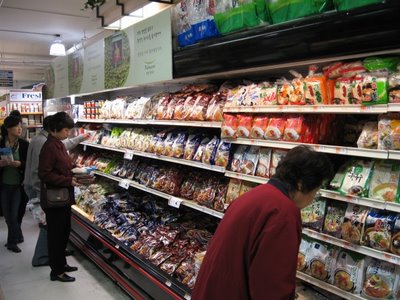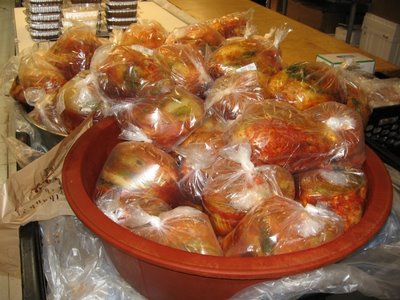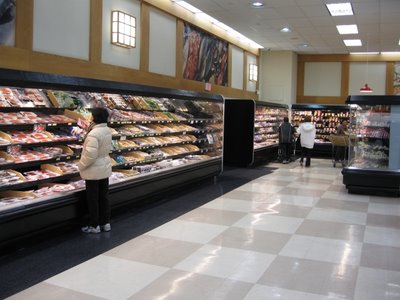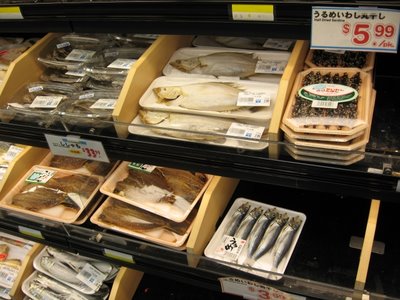One special perk of being located just outside of New York in the Jersey suburbs are the huge immigrant populations that have always used the Garden State as refuge from the city's insane real estate costs. Just across the Hudson River in Fort Lee and Edgewater are large Korean and Japanese shopping malls. The local spicy rotten cabbage emporium is the
Han Ah Reum in Ridgefield, NJ.

I consider myself lucky - I actually love Korean food. In New Jersey, for some odd reason, no other non-Korean will admit to liking Korean food. Korean food is , admittedly, one of the more
out there cuisines on the planet, rating up there with Polar Eskimo and Finnish food for divergence from Western food norms. (Polar Eskimos eat fermented auks and rotten green seal meat. The Finns - using different ingredients - aim to make all their food
taste like fermented auks and rotten green seal meat.) The Koreans like bold flavors -
very hot,
very sour,
very beefy, anything as long as it is
very. They are not shy eaters.

Some of these New Jersey ethnic supermarkets are simply humongous - a celebration of increased spending ability compared to the old country. The Koreans came to the NY area after the fall of the "Asian Bubble" economy in the 1990s, and they have done very well for themselves. If you need your nails painted, or you automobile transmission fixed, Mr. Park and Mr. Kim will be very happy to oblige.

Korean food means
kimchee. Kimchee are salted and fermented spicy vegetables essential to any Korean meal. Salted cabbage is the classic kimchee. Every culture has a food specific to ...
digestive emissions. What bean soup and stuffed cabbage are to eastern Europe, kimchee is to Asian cuisines. If anybody wishes to make fart jokes, please, now is the time. Go ahead. We are talking about kimchee, so we are expecting some fart jokes. Really, we expect such things when kimchee is the topic of the day.

Just down the road from the Korean enclave is Edgewater, NJ, home to the
Mitsuwa shopping center , a Japanese mall transported to New Jersey that serves the New York Japanese community. The Japanese are more like ex-pats in Europe - here now in body, but not necessarily in spirit. Most Japanese are on company contracts for several years in NewYork, and the Mitsuwa offers them everything from fresh tuna sashimi to Japanese toothepastes and laundry powder. Walking into Mitsuwa is like walking into a transplanted suburb of Tokyo.

Friends of ours in Budapest and Transylvania have all heard Fumie's stories about shopping at Mitsuwa. Well, this is where all that wasabi comes from. Since Fumie is in Tokyo right now, I can actually come here and not buy everything to take back to Budapest. And I can pass on delicacies such as half-dried stinky little fish for TV snacks!

Still, anyplace that is Japanese-owned and offering fresh bento boxes of sushi for under five dollars can't be passed up easily.

Half of the
Mitsuwa Center consists of a food court that includes favorites such as Japanese-style Italian food, a St. Honore Japanese-style french pastry shop, and various stands offering Japanese pancakes, fried katsu (cutlet) dishes and ramen noodle soup. Since I can choose whatever I want (not possible when Fumie is around because she knows
far better than I what I want) I went for salt pork ramen soup. Not Kosher. Not at all.
Very goooood.

Gyoza, Japanese dumplings. Certain Croatians I know would kill for a plate of these. But Fumie makes better gyoza at home using ingredients from the Bosznyak tér market. .

 I consider myself lucky - I actually love Korean food. In New Jersey, for some odd reason, no other non-Korean will admit to liking Korean food. Korean food is , admittedly, one of the more out there cuisines on the planet, rating up there with Polar Eskimo and Finnish food for divergence from Western food norms. (Polar Eskimos eat fermented auks and rotten green seal meat. The Finns - using different ingredients - aim to make all their food taste like fermented auks and rotten green seal meat.) The Koreans like bold flavors - very hot, very sour, very beefy, anything as long as it is very. They are not shy eaters.
I consider myself lucky - I actually love Korean food. In New Jersey, for some odd reason, no other non-Korean will admit to liking Korean food. Korean food is , admittedly, one of the more out there cuisines on the planet, rating up there with Polar Eskimo and Finnish food for divergence from Western food norms. (Polar Eskimos eat fermented auks and rotten green seal meat. The Finns - using different ingredients - aim to make all their food taste like fermented auks and rotten green seal meat.) The Koreans like bold flavors - very hot, very sour, very beefy, anything as long as it is very. They are not shy eaters. Some of these New Jersey ethnic supermarkets are simply humongous - a celebration of increased spending ability compared to the old country. The Koreans came to the NY area after the fall of the "Asian Bubble" economy in the 1990s, and they have done very well for themselves. If you need your nails painted, or you automobile transmission fixed, Mr. Park and Mr. Kim will be very happy to oblige.
Some of these New Jersey ethnic supermarkets are simply humongous - a celebration of increased spending ability compared to the old country. The Koreans came to the NY area after the fall of the "Asian Bubble" economy in the 1990s, and they have done very well for themselves. If you need your nails painted, or you automobile transmission fixed, Mr. Park and Mr. Kim will be very happy to oblige. Korean food means kimchee. Kimchee are salted and fermented spicy vegetables essential to any Korean meal. Salted cabbage is the classic kimchee. Every culture has a food specific to ... digestive emissions. What bean soup and stuffed cabbage are to eastern Europe, kimchee is to Asian cuisines. If anybody wishes to make fart jokes, please, now is the time. Go ahead. We are talking about kimchee, so we are expecting some fart jokes. Really, we expect such things when kimchee is the topic of the day.
Korean food means kimchee. Kimchee are salted and fermented spicy vegetables essential to any Korean meal. Salted cabbage is the classic kimchee. Every culture has a food specific to ... digestive emissions. What bean soup and stuffed cabbage are to eastern Europe, kimchee is to Asian cuisines. If anybody wishes to make fart jokes, please, now is the time. Go ahead. We are talking about kimchee, so we are expecting some fart jokes. Really, we expect such things when kimchee is the topic of the day.  Just down the road from the Korean enclave is Edgewater, NJ, home to the Mitsuwa shopping center , a Japanese mall transported to New Jersey that serves the New York Japanese community. The Japanese are more like ex-pats in Europe - here now in body, but not necessarily in spirit. Most Japanese are on company contracts for several years in NewYork, and the Mitsuwa offers them everything from fresh tuna sashimi to Japanese toothepastes and laundry powder. Walking into Mitsuwa is like walking into a transplanted suburb of Tokyo.
Just down the road from the Korean enclave is Edgewater, NJ, home to the Mitsuwa shopping center , a Japanese mall transported to New Jersey that serves the New York Japanese community. The Japanese are more like ex-pats in Europe - here now in body, but not necessarily in spirit. Most Japanese are on company contracts for several years in NewYork, and the Mitsuwa offers them everything from fresh tuna sashimi to Japanese toothepastes and laundry powder. Walking into Mitsuwa is like walking into a transplanted suburb of Tokyo.  Friends of ours in Budapest and Transylvania have all heard Fumie's stories about shopping at Mitsuwa. Well, this is where all that wasabi comes from. Since Fumie is in Tokyo right now, I can actually come here and not buy everything to take back to Budapest. And I can pass on delicacies such as half-dried stinky little fish for TV snacks!
Friends of ours in Budapest and Transylvania have all heard Fumie's stories about shopping at Mitsuwa. Well, this is where all that wasabi comes from. Since Fumie is in Tokyo right now, I can actually come here and not buy everything to take back to Budapest. And I can pass on delicacies such as half-dried stinky little fish for TV snacks!  Still, anyplace that is Japanese-owned and offering fresh bento boxes of sushi for under five dollars can't be passed up easily.
Still, anyplace that is Japanese-owned and offering fresh bento boxes of sushi for under five dollars can't be passed up easily.  Half of the Mitsuwa Center consists of a food court that includes favorites such as Japanese-style Italian food, a St. Honore Japanese-style french pastry shop, and various stands offering Japanese pancakes, fried katsu (cutlet) dishes and ramen noodle soup. Since I can choose whatever I want (not possible when Fumie is around because she knows far better than I what I want) I went for salt pork ramen soup. Not Kosher. Not at all. Very goooood.
Half of the Mitsuwa Center consists of a food court that includes favorites such as Japanese-style Italian food, a St. Honore Japanese-style french pastry shop, and various stands offering Japanese pancakes, fried katsu (cutlet) dishes and ramen noodle soup. Since I can choose whatever I want (not possible when Fumie is around because she knows far better than I what I want) I went for salt pork ramen soup. Not Kosher. Not at all. Very goooood. Gyoza, Japanese dumplings. Certain Croatians I know would kill for a plate of these. But Fumie makes better gyoza at home using ingredients from the Bosznyak tér market. .
Gyoza, Japanese dumplings. Certain Croatians I know would kill for a plate of these. But Fumie makes better gyoza at home using ingredients from the Bosznyak tér market. . 
1 comment:
You're making us drool here in Albania... where all we have is the lowly Qofta. waaahhhh!
Post a Comment